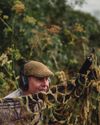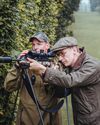
For advocates of lead ammunition, the arguments have become academic. The leaders of our major shooting and countryside organizations have signed a statement in support of the removal of lead — and single-use plastic — from all ammunition used for hunting game, within five years (News, 4 March).
Critics will not see this as final. However, my nose for historical momentum tells me that their voices will go unheeded and they will become increasingly less relevant, essentially disenfranchising themselves politically from the process of dealing with a new reality.
It is important to be clear on what has, and what has not, happened. Lead has not been banned and our organizations have not come out in support of a legal ban on lead shot.
They have expressed a desire for a five-year period in which lead will remain freely available, and used by those who wish to use it, but during which the shooting industry and related trades work hard to encourage its phasing out, the development of alternatives and the promotion of their widespread adoption.
Hopefully, this will kneecap those currently driving the legislative agenda and persuade the Government to take a pause and see how self-regulation changes the situation, reducing the motivation to find parliamentary time to create a legal ban on lead ammunition.
The majority of people on commercial shoots use a gun that can already take standard steel shot. They will have to start using it.
Lead bans are not unique to the UK. Legislation began in many countries after the acceptance of the African-Eurasian Migratory Waterbird Agreement in 1999. It was prompted by scientific studies, going back to the 1880s, that showed bottom-feeding waterfowl were being poisoned by ingesting lead shot.
A look at the history and consequences of lead bans in other countries may show us how the future here could look.
New Zealand
Diese Geschichte stammt aus der March 11, 2020-Ausgabe von Shooting Times & Country.
Starten Sie Ihre 7-tägige kostenlose Testversion von Magzter GOLD, um auf Tausende kuratierte Premium-Storys sowie über 8.000 Zeitschriften und Zeitungen zuzugreifen.
Bereits Abonnent ? Anmelden
Diese Geschichte stammt aus der March 11, 2020-Ausgabe von Shooting Times & Country.
Starten Sie Ihre 7-tägige kostenlose Testversion von Magzter GOLD, um auf Tausende kuratierte Premium-Storys sowie über 8.000 Zeitschriften und Zeitungen zuzugreifen.
Bereits Abonnent? Anmelden

United we stand
Following United Utilities' decision to end grouse shooting on its land, Lindsay Waddell asks what will happen if we ignore our vital moors

Serious matters
An old gamebook prompts a contemplation on punt-gunning

They're not always as easy as they seem
While coneys of the furry variety don't pose a problem for Blue Zulu, he's left frustrated once again by bolting bunnies of the clay sort

Debutant gundogs
There's lots to think about when it comes to making the decision about when to introduce your dog to shooting

When the going gets rough
Al Gabriel returns to the West London Shooting School to brush up on his rough shooting technique

The Field Guide To British Deer - BDS 60th Anniversary Edition
In this excerpt from the 60th anniversary edition of the BDS's Field Guide To British Deer, Charles Smith-Jones considers the noise they make

A step too far?
Simon Garnham wonders whether a new dog, a new gun and two different fields in need of protection might have been asking too much for one afternoon's work

Two bucks before breakfast
A journey from old South London to rural Hertfordshire to stalk muntjac suggests that the two aren't as far detached as they might seem

Stalking Diary
Stalkers can be a sentimental bunch, and they often carry a huge attachment to their hill

Gamekeeper
Alan Edwards believes unique, private experiences can help keepers become more competent and passionate custodians of the countryside